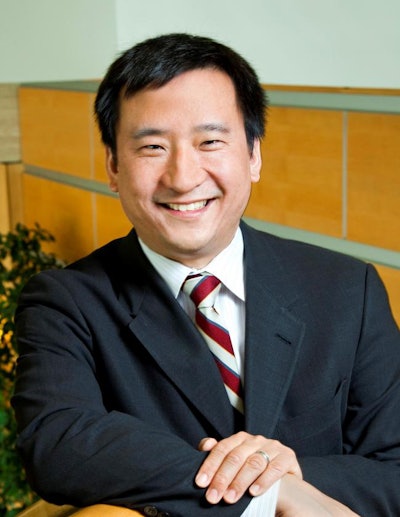“You all look alike,” is what people told me when I was a kid growing up. As an Asian American in the Midwest in the 1970s, before diversity was “a thing,” I was always aware my family was different — and difference was not celebrated. I laugh, or try to, now if anyone accuses me of identity politics. They have it backwards: I struggled to assimilate, to avoid being marked by my heritage. I understood to be accepted by my peers, I had to forsake my ancestors.
The people who told me they could not distinguish among Asians were trying to do me a favor. They were explaining as sincerely as they could why they were prejudiced. They likely were unaware of the long-lived theme of Asians as the “Yellow Peril.” That concept originally referred to a massive horde of inscrutable faces. It has continued to suggest alien forces invading and taking over.
“You all look alike” has two connotations. They are the reasons Asian Americans declare themselves as such.
 Frank Wu
Frank WuThe first implication is Chinese, Japanese, Korean, Vietnamese, and so on, at least among those of East Asian background, are identical. That other saying that constituted the common cruelty of childhood, the sing-song chant about “Chinese, Japanese, dirty knees, what are these?” which ends with one’s tormentor’s pulling their eyes back in a slant, hooting at how clever their ditty was, repeats the sentiment. So Chinese are attacked during Japan-bashing, and vice versa. Korean Americans, whose families may have been oppressed by Chinese and Japanese alike, ironically are treated as if they were both or either. To be “Asian” is to come together in mutual defense as well as idealism — even if overseas our grandparents fought total wars against each other, here we are compelled to unite.
The second implication is that citizenship is irrelevant, even if by birthright. Chinese and Chinese Americans are the same as Italians and Italian Americans are not; on St. Patrick’s Day, everyone wishes to be an honorary Irishman, but on the Lunar New Year, others do not announce they are a “Chinaman.” The descendants of the railroad workers who built the western half of the transcontinental railroad that realized Manifest Destiny, tying the frontier to the Eastern seaboard when finished in 1869, include sixth generation Californians. Adoptees may have “forever families” that are White, Anglo-Saxon Protestants, and those of blended backgrounds might have forebears who came over on the Mayflower. Even those who fought and fled regimes, again ironically, may be identified with them, indelibly despite their protest. To be “Asian American” is to emphasize one is not a tourist who forgot the camera in the hotel room, or a sojourner temporarily here as if to extract gold and return to where one is “really” from; it is to proclaim a permanent stake on this side of the Pacific Ocean.
For Asian Americans, this is a moment of vulnerability. We are suspects. Our co-workers and neighbors seem ready to report that we are spies, foreign agents, thieves of trade secrets, or sleeper agents waiting for a signal to rise up. Strangers on the street not only fear we are contagious with coronavirus, but also blame us as culpable for the disease, a pandemic that matches its biological devastation with economic destruction. As demagogues espouse open hatred toward Chinese, I am not comforted — who would be? — by the assurance they make an exception for me.
The rhetoric should not be dismissed. It is not hyper-sensitive “political correctness” to stand up and speak out. Long ago in the heartland, I was told to reply that sticks and stones would break my bones, but words would never hurt me. Even then, I tried not to be naive: the words lead to the sticks and stones. People are being attacked. Even health care workers on the front lines, among whom Asian Americans are overrepresented, who deserve the utmost gratitude are being shunned and worse.
Asian Americans argue among ourselves about strategy. Some urge displays of patriotism. Others are offended that they, selectively, are forced to recite a loyalty oath. Asian Americans who are not Chinese have come out for solidarity; they are not adding to social distancing with political distancing. Chinese immigrants of more recent vintage may be tempted toward their own ethnic nationalism, insisting on the might of an ascendant power to protect them.
Yet I hold out hope. Asian Americans have allies among other people of color and all whose ideals are inclusive. More importantly, Asian Americans have achieved leadership roles, and Asian Americans have developed critical mass. Whether it is in the borough of Queens, New York City, the center of the center of the crisis, or in the suburbs of Los Angeles, or in between in metropolitan areas such as Las Vegas that have become Asian over the course of the decade between Census counts, Asian Americans have arrived.
Frank H. Wu is the William L. Prosser Distinguished Professor at the University of California Hastings College of the Law. This summer he will assume the presidency at Queens College in New York. You can follow him on Twitter @frankhwu















